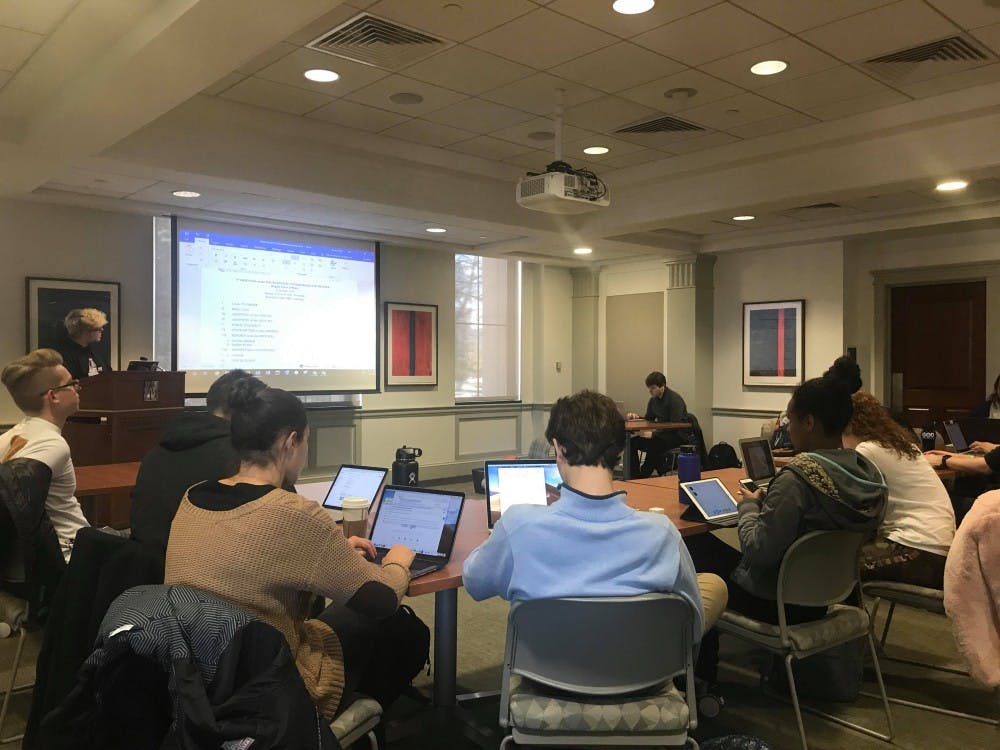In a report released by the Student Government Senate Finance Committee, SG members addressed the organization’s budget transparency issues, along with outlining stipend allocations to student leaders and recommending financial steps that SG could take to improve students’ trust in its decisions.
The report, “Opening the Books: A Detailed Look at AUSG’s Finances,” breaks down specific budget allocations to organizations within SG such as Kennedy Political Union and Women’s Initiative.
Primarily written by Bobby Zitzmann, a senator for the class of 2019 and chair of the Finance Committee, the report comes in the wake of the failed student activity fee referendum, which took place in October.
The aim of the report is to be transparent about how money is allocated within and outside of SG, and includes information about Student Media Board and Club Council, Zitzmann said. Additionally, it provides historical context for many of the decisions made in the budget.
“Having, internally, a higher degree of transparency and awareness about our finances...can lead to better discussions internally about how we use the money and better decision making in that process,” Zitzmann said. “We're pretty much being as transparent as possible with all this information being released, insofar as it actually reaches students.”
The report covers how the student activity fee works, compares it to other schools similar to AU and addresses the problems caused by inflation over time.
According to SG, AU is in the lowest third of comparable schools for student activity fee cost, weighing in at $88.50 per semester, while universities such as Vanderbilt University , Washington University in St. Louis and Johns Hopkins University charge more than $250 per semester.
The report highlights the amount stipended to various positions within SG, SMB and AUCC. The stipends vary in amount, from $250 for two assistant secretaries to $9,000 for SG President Valentina Fernández.
This information was already public, Zitzmann said, but it was never easy to find.
“One of our recommendations is to make that information more public, just on our website,” he said. “Then anyone can find [it].”
The report finishes with recommendations to SG based on its financial information. These include publishing and updating the current budget and stipends on the SG website, studying and publishing data concerning programming, merchandise, advertising expenses, and writing justifications for the yearly budget and stipend adjustments and decisions.
Another one of the report’s recommendation: maintaining a webpage that explains the financial allocation process for student organizations, specifically concerning the actions of AUSG, SMB, AUCC and the Budget Advisory Committee. Additionally, the report recommends reducing or eliminating purchases of AUSG merchandise.
“As far as ethics are concerned, I can't see a difference between Student Government drawing $40 in cash out of an ATM to give to a member, versus getting that member a $40 sweatshirt,” Zitzmann said. “It’s student money being used for AUSG members to get things for themselves.”
Five pages of outside comment and critique were provided by senior Sam Rogers, a previous SG and Residence Hall Association representative, in an earlier version of the report. However, that critique was cut for the final release.
The entire section was cut, Zitzmann and Rogers explained, because SG determined that the report wasn’t centered on AUCC, and so the response shouldn’t be either. Rogers said that he didn’t want his response to be selectively edited down and left it up to SG to either keep or remove the entire piece.
In an interview, Rogers said the comment included criticism of AUCC for being an “unaccountable undemocratic organization.”
“They have no real incentive to be accountable and to change the way things work,” Rogers said.
He added that the report may provide useful recommendations to students in elected office.
“[The report] probably will be helpful to people in Student Government in terms of like, ‘Oh, these are recommendations, we should follow them and change things,’” Rogers said. “But in terms of making things more accessible to students, and making sure they understand the process, I don't think this really does anything.”
Asher Weinstein contributed reporting to this article.
Correction: This article has been corrected to reflect that the lowest stipend in Student Government is $250, not $850, and Bobby Zitzmann represents the Class of 2019, not 2020.





